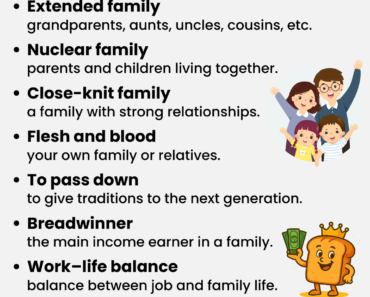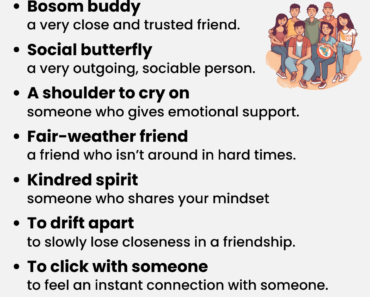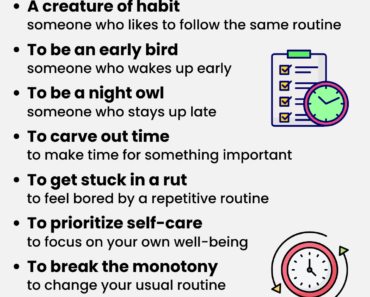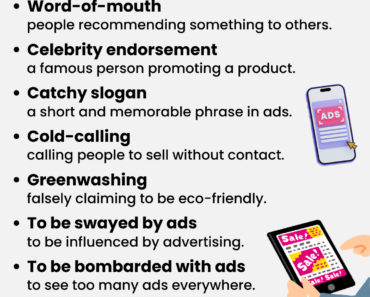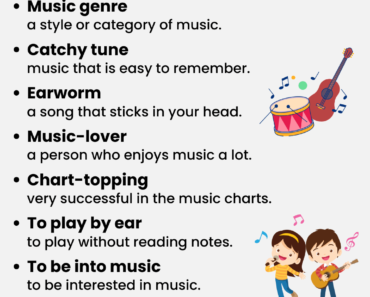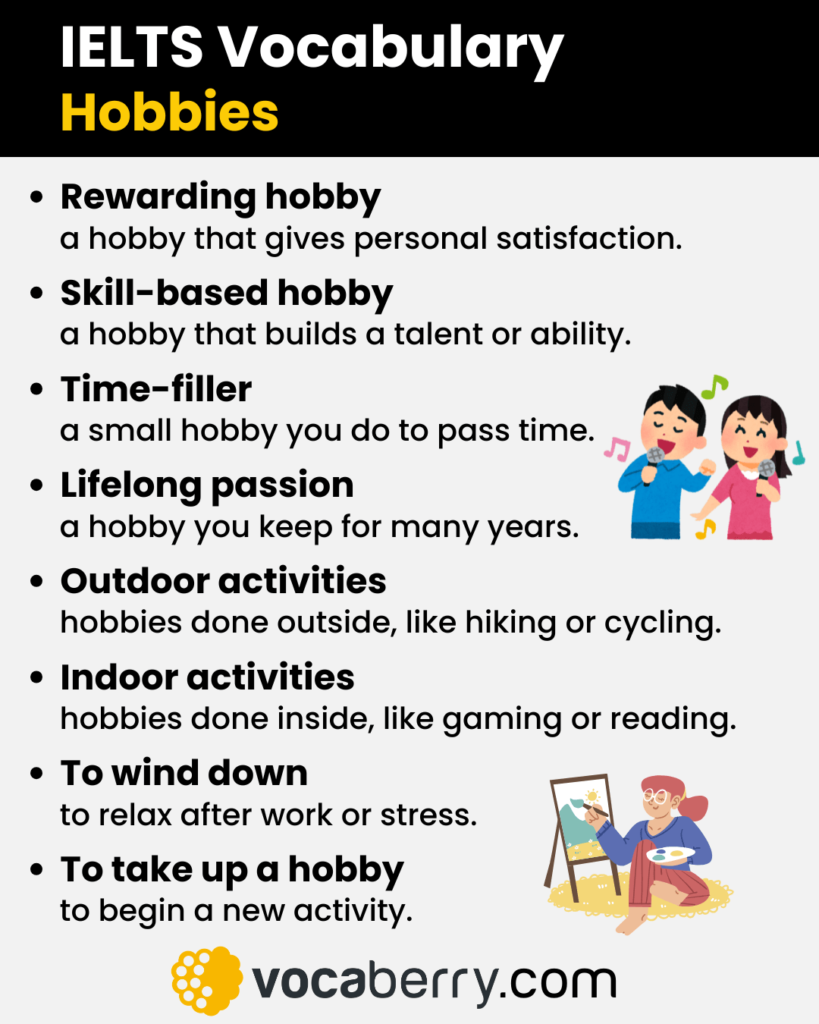
Hobbies and free-time activities are one of the most popular topics in the IELTS Speaking test. Examiners often ask you about your free time activities, how you spend your leisure time, or why certain hobbies are important to you. In this guide, you’ll find useful IELTS vocabulary for hobbies with clear definitions, followed by IELTS Speaking Part 1, Part 2, and Part 3 questions with sample answers. These examples will help you use the vocabulary effectively in the exam.
IELTS Vocabulary for Hobbies
Here is some useful IELTS vocabulary for talking about hobbies with clear definitions. These words and phrases will help you give better answers in the IELTS Speaking test.
- Leisure time – free time not spent working or studying.
- Pastime – an activity you regularly enjoy in your free time.
- Recreational activity – something done for enjoyment.
- Outdoor pursuits – hobbies done outside, like hiking or cycling.
- Indoor activities – hobbies done inside, like reading or gaming.
- Physical activity – exercise or sports that keep you active.
- Mind-stimulating hobby – activity that challenges the brain, like chess.
- Skill-based hobby – a hobby where you learn and develop a talent.
- Team sport – sport played with others, like football.
- Solo activity – a hobby done alone, like running or painting.
- To get into something – to become interested in a hobby.
- To stick with it – to continue a hobby without giving up.
- To wind down – to relax after work or stress.
- To switch off – to stop thinking about work or worries.
- To take up a hobby – to begin a new activity.
- To drop a hobby – to stop doing an activity.
- To be passionate about – to really enjoy something.
- To have a knack for – to be naturally good at something.
- To be hooked on – to be addicted or very interested in a hobby.
- Time-filler – a small hobby you do to pass time.
- Time-consuming hobby – a hobby that takes a lot of time.
- Sedentary hobby – hobbies you do sitting down, like gaming or reading.
- High-maintenance hobby – a hobby that requires a lot of time, money, or effort.
- Low-commitment hobby – an easy hobby you can do without much effort.
- Skill-enriching hobby – a hobby that helps you develop useful abilities.
- Hands-on hobby – practical activities, like gardening or woodworking.
- Occasional hobby – a hobby you only do from time to time.
- Creative pursuit – activities like painting, music, or writing.
- Rewarding hobby – a hobby that gives personal satisfaction.
- Expensive hobby – a hobby that costs a lot of money.
- Low-cost hobby – a hobby that doesn’t require much money.
- Seasonal hobby – a hobby you can only do in certain seasons.
- Collecting hobby – collecting items like stamps or coins.
- Competitive hobby – a hobby involving competition with others.
- To pursue a hobby – to actively do and follow a hobby.
- Pick-up-and-play hobby – something easy to start without much skill.
- Relaxing hobby – an activity that helps you rest and recover.
- Lifelong passion – a hobby you keep for many years.
- Hobbyist – a person who regularly enjoys a certain activity.
IELTS Speaking: Hobbies Questions & Answers
In this section, you’ll find IELTS Speaking Part 1, Part 2, and Part 3 questions on hobbies and free-time activities with sample answers. These examples show how the hobbies vocabulary can be used in your responses during the test.
IELTS Speaking Part 1 – Hobbies
Do you have any hobbies or free-time activities?
Yes, I do. In my leisure time, I usually go hiking or cycling. I enjoy these outdoor pursuits because they help me switch off from work and keep me healthy.
How much time do you usually spend on your hobbies?
I try to spend at least an hour a day on my hobbies. In the evenings, I like to wind down with indoor activities like reading. At weekends, I spend more time on physical activities such as swimming.
Have you recently started a new hobby?
Yes, I recently took up photography. At first it was just a pastime, but now it feels like a skill-enriching hobby because I’m learning how to edit pictures and improve my shots.
Do you prefer doing hobbies alone or with other people?
I usually prefer team sports like football because I enjoy the social atmosphere. But sometimes, when I need to relax, I go for solo activities such as writing or sketching, since they give me peace and quiet.
What kind of hobbies are popular in your country?
I’d say collecting hobbies like stamps are less common nowadays, but people are passionate about physical activities such as running or going to the gym. Some also enjoy low-cost hobbies like gardening or drawing.
IELTS Speaking Part 2 – Hobbies Cue Card
Describe a hobby you enjoy in your free time.
You should say:
- what it is
- how you started it
- how often you do it
- and explain why you enjoy it.
Sample Answer:
One hobby that I’ve really come to love is gardening. I first got into it a couple of years ago when I decided to take up a hobby that would keep me busy during my leisure time at home. At the beginning, I thought it would just be an occasional hobby, but surprisingly it’s turned into something I feel really passionate about.
I usually spend time in the garden every weekend. It’s quite a hands-on hobby, because you’re constantly planting seeds, watering plants, and even dealing with weeds. What I like is that it changes with the seasons, so in a sense it’s also a seasonal hobby. For example, in spring I usually grow tomatoes and herbs, while in autumn I focus more on flowers. It keeps me active and gives me something meaningful to look forward to outside of my routine.
Gardening, for me, is both a relaxing hobby and a rewarding hobby. On one hand, it helps me switch off and wind down after a stressful week. There’s something calming about spending time outdoors, away from screens, and just focusing on simple tasks. On the other hand, it’s really satisfying to see the results of your effort. Watching a plant grow day by day, and eventually harvesting vegetables or enjoying the flowers, makes it a truly skill-enriching hobby that gives me a sense of achievement.
Another thing I value is that gardening is a low-cost hobby compared to others. It doesn’t require expensive equipment, just patience and consistency. But at the same time, it teaches discipline and responsibility, because plants won’t survive unless you take care of them regularly. That’s why I’d say it has almost become a lifelong passion for me. I honestly can’t imagine giving it up anytime soon.
IELTS Speaking Part 3 – Hobbies Discussion
IELTS Speaking Part 3 questions about hobbies often ask you to compare different activities, discuss their benefits, and give opinions on how people spend their free time.
Do you think people today have less leisure time than in the past?
Yes, I think so. Nowadays, with busy work schedules and the pressure to maintain a good work–life balance, many people struggle to find enough leisure time. In the past, life was slower, so people could spend more time on recreational activities or family gatherings. Today, hobbies are often treated as a quick time-filler, like scrolling on social media, instead of a meaningful way to relax.
How important is it for children to have hobbies?
I believe hobbies are essential for children because they’re more than just a pastime. For example, skill-based hobbies like playing an instrument or painting help children develop creativity, while team sports teach cooperation and discipline. Having a creative pursuit also allows them to express emotions in a healthy way. Overall, hobbies build confidence and valuable life skills that can’t always be learned in school.
Do you think expensive hobbies are better than low-cost ones?
Not necessarily. Expensive hobbies like skiing or photography can be exciting, but they aren’t always practical. Many low-cost hobbies, such as reading, drawing, or gardening, can be just as rewarding and sometimes even more sustainable in the long run. I think the value of a hobby doesn’t come from the price, but from the satisfaction and relaxation it brings.
How do hobbies benefit people in their professional lives?
Hobbies can be very beneficial. For instance, mind-stimulating hobbies like chess improve problem-solving, while skill-enriching hobbies such as public speaking or writing can directly support career growth. Even physical activities like running or yoga help reduce stress, so people perform better at work. In my opinion, having hobbies shows you are a well-rounded person, which employers often appreciate.
Do you think traditional hobbies are disappearing?
To some extent, yes. With modern technology, many young people prefer digital entertainment over collecting hobbies or hands-on hobbies like woodworking. However, I don’t think traditional hobbies will completely vanish. In fact, some people are returning to them as a way to switch off from screens and enjoy something more authentic.
More IELTS Vocabulary Topics
If you found this lesson useful, explore other IELTS Speaking topics to expand your vocabulary and practice with sample answers:
- IELTS Vocabulary: Accommodation
- IELTS Vocabulary: Advertisement
- IELTS Vocabulary: Animals
- IELTS Vocabulary: Art
- IELTS Vocabulary: Artificial Intelligence
- IELTS Vocabulary: Books
- IELTS Vocabulary: Childhood
- IELTS Vocabulary: Crime and Punishment
- IELTS Vocabulary: Culture and Traditions
- IELTS Vocabulary: Daily Routine
- IELTS Vocabulary: Education
- IELTS Vocabulary: Environment
- IELTS Vocabulary: Family
- IELTS Vocabulary: Fashion and Clothes
- IELTS Vocabulary: Films
- IELTS Vocabulary: Food & Diet
- IELTS Vocabulary: Friends
- IELTS Vocabulary: Gifts
- IELTS Vocabulary: Health
- IELTS Vocabulary: Hometown
- IELTS Vocabulary: Money
- IELTS Vocabulary: Museums
- IELTS Vocabulary: Music
- IELTS Vocabulary: Plants
- IELTS Vocabulary: Shopping
- IELTS Vocabulary: Social Media
- IELTS Vocabulary: Sports
- IELTS Vocabulary: Technology
- IELTS Vocabulary: Transport
- IELTS Vocabulary: Travel
- IELTS Vocabulary: Weather
- IELTS Vocabulary: Work & Jobs

